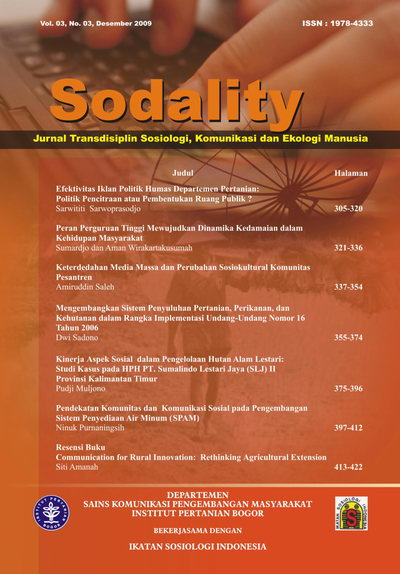Community and Social Communication Approaches on Development of Water Supply System
DOI:
https://doi.org/10.22500/sodality.v3i3.5857Abstract
The government of Indonesia is obliged to provide continuous supply of drinking water in good quality to the people so that they can live well and productive. Under the framework of local autonomy regime, all physical development efforts, including sufficing drinking water, done at local level must be the responsibility of the local government together with civil society. Therefore, local community is expected to actively involve in the formulation of drinking water development program. Community-based and social communication approaches oriented toward local empowerment are chosen as primary strategy to achieve the development of water supply system. Social communication approach occurs in the form of social advocacy in the policy-making processes so that the policy becomes more sensitive to the needs of the local people. It is expected that by doing so the policy will be supportive to the need of local people. This article is to analyze the development of drinking water supply systems managed by government and NGOs as well as with local people. Some of them are not sustainable in terms of its policy processes continuity. The study reveals that such situation occurs due to less participation or support of local citizens and inappropriate local government policy supporting toward the program. This paper intends to elaborate more on the topics of community and social communication approaches relating to the development of water supply system.Downloads
Published
2009-12-09
Issue
Section
Articles
License
Authors who publish with this journal agree to the following terms:
- Authors retain copyright and grant the journal right of first publication with the work simultaneously licensed under a

This work is licensed under a Creative Commons Attribution 4.0 International License. that allows others to share the work with an acknowledgement of the work's authorship and initial publication in this journal. - Authors are able to enter into separate, additional contractual arrangements for the non-exclusive distribution of the journal's published version of the work (e.g., post it to an institutional repository or publish it in a book), with an acknowledgement of its initial publication in this journal.
- Authors are permitted and encouraged to post their work online (e.g., in institutional repositories or on their website) prior to and during the submission process, as it can lead to productive exchanges, as well as earlier and greater citation of published work (See The Effect of Open Access).
How to Cite
Purnaningsih, N. (2009). Community and Social Communication Approaches on Development of Water Supply System. Sodality: Jurnal Sosiologi Pedesaan, 3(3). https://doi.org/10.22500/sodality.v3i3.5857












.png)

